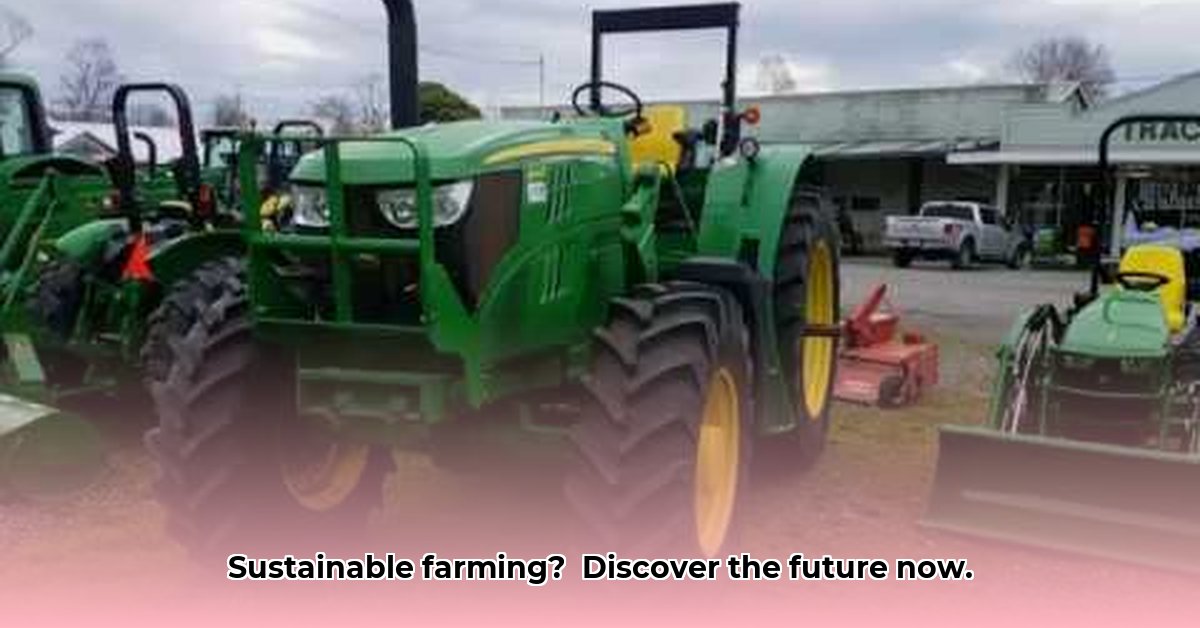
Company Overview: A Long History in Northern California Agriculture
Fernbridge Tractor & Equipment Co. has served Humboldt, Del Norte, and Trinity Counties in Northern California for over 50 years, establishing itself as a significant supplier of agricultural machinery. Their inventory includes established brands like John Deere and Generac, known for durability and longevity—characteristics crucial for efficient and sustainable farming practices. This long lifespan contributes to reduced waste and minimizes the need for frequent equipment replacements, a key element of sustainable agriculture. However, the extent to which Fernbridge actively promotes truly sustainable practices requires further investigation. For examples of sustainable canopy designs, see canopy options.
Sustainability Assessment: A Mixed Bag of Progress and Potential
While Fernbridge's provision of reliable, long-lasting equipment contributes to sustainable farming by reducing downtime and waste, their current offerings primarily consist of traditional, gas-powered machinery. A significant gap exists in readily available data regarding their overall environmental impact. Crucial information, such as energy consumption and waste generation figures, is absent, hindering any definitive assessment of their contribution to sustainability. Their repair and maintenance services, extending the operational lifespan of existing equipment, represent a positive aspect. However, the longevity of conventional machinery alone might not fully address the environmental challenges of modern farming. A shift towards more eco-friendly options is generally considered necessary by experts for a truly sustainable agricultural future.
Opportunities for Enhanced Sustainability: Growth and Innovation
Fernbridge possesses significant opportunities to elevate its commitment to sustainable agriculture. Three pivotal steps could significantly enhance their environmental performance:
- Expand Equipment Options: Incorporating electric tractors or those powered by alternative fuels (like biodiesel) into their inventory would provide farmers with more sustainable choices. This requires careful market research to determine the feasibility and demand for such equipment within their specific agricultural context.
- Prioritize Transparency: Conducting a thorough environmental impact assessment, covering energy use and waste management, would provide valuable data. Publicly sharing these findings would foster trust and demonstrate a tangible commitment to sustainable practices. Collaboration with environmental consultants specializing in agricultural operations could prove beneficial.
- Foster Collaboration: Partnering with agricultural scientists and equipment manufacturers can facilitate the development of innovative, region-specific sustainable solutions. This collaborative approach could accelerate the adoption of sustainable technologies within the farming community, potentially unlocking access to additional funding and grants for equipment upgrades.
Stakeholder Analysis: A Collaborative Approach to a Sustainable Future
Sustainable agriculture requires a collaborative effort from multiple stakeholders. Each party plays a distinct role in fostering a more environmentally responsible approach:
| Stakeholder | Short-Term Actions | Long-Term Goals |
|---|---|---|
| Fernbridge Tractor & Equipment | Improve equipment maintenance programs, investigate sustainable equipment options. | Become a leader in sustainable agricultural equipment; reduce their environmental footprint; actively promote sustainable farming practices. |
| Local Farmers | Implement soil health practices, explore water-wise farming techniques. | Transition to sustainable farming methods; actively participate in collaborative research projects. |
| Government Agencies | Provide funding for sustainable agriculture research and incentives. | Develop and implement policies that support sustainable farming practices; offer financial aid for farmer transitions to eco-friendly equipment. |
| Consumers | Choose sustainably produced food; support local farmers' markets. | Demand transparency about environmental impacts of food production; actively seek sustainable food options; make informed purchasing choices. |
Risk Assessment & Mitigation: Navigating the Challenges
The transition towards sustainable agriculture presents challenges. A proactive approach to risk management is crucial:
| Risk Factor | Probability | Impact | Mitigation Strategy |
|---|---|---|---|
| Limited Availability of Sustainable Equipment | Medium | Medium | Actively explore and secure partnerships with manufacturers of sustainable agricultural technology, providing a wider selection for customers. |
| High Upfront Costs of Sustainable Equipment | High | High | Work with government agencies and financial institutions to explore financing options and subsidies for farmers adopting new technologies. |
| Farmer Resistance to New Technologies | Medium | Medium | Offer training and support to farmers transitioning to sustainable equipment and methods. |
| Uncertainty about Long-Term ROI for Sustainable Practices | High | Medium | Conduct research and provide clear data to farmers demonstrating the long-term economic and environmental benefits of sustainable methods. |
Regulatory Compliance: A Need for Further Research
A comprehensive assessment of Fernbridge’s regulatory compliance concerning emissions, waste disposal, and chemical handling necessitates further investigation. The currently available information is insufficient to provide a full evaluation. Additional research is needed to understand and verify compliance with all applicable environmental standards.
Conclusion: A Path Towards Sustainable Farming in Northern California
Fernbridge Tractor & Equipment plays a pivotal role in shaping the future of sustainable agriculture in Northern California. While their existing services contribute positively, realizing their full potential requires a proactive commitment to transparency, innovation, and collaboration. The path toward a truly sustainable agricultural future depends heavily on the collective efforts of all stakeholders, including Fernbridge, local farmers, government agencies, and consumers. Further research and data collection are crucial for a complete understanding of their impact and ongoing progress.